复合句讲解和练习
外研版八年级下册并列复合句讲解及练习(含答案)
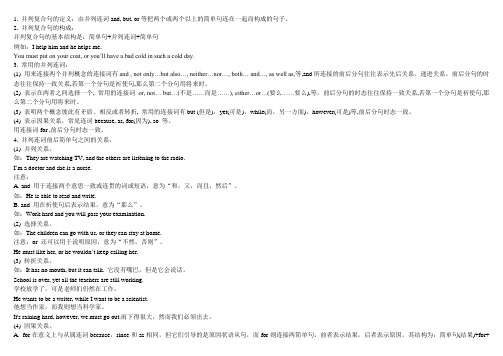
1. 并列复合句的定义:由并列连词and, but, or等把两个或两个以上的简单句连在一起而构成的句子。
2. 并列复合句的构成:并列复合句的基本结构是:简单句+并列连词+简单句例如:I help him and he helps me.You must put on your coat, or you’ll have a bad cold in such a cold day.3. 常用的并列连词:(1) 用来连接两个并列概念的连接词有and , not only…but also…, neither…nor…, both… and…, as well as,等,and所连接的前后分句往往表示先后关系、递进关系。
前后分句的时态往往保持一致关系,若第一个分句是祈使句,那么第二个分句用将来时。
(2) 表示在两者之间选择一个, 常用的连接词or, not… but…(不是……而是……), either…or…(要么……要么),等,前后分句的时态往往保持一致关系,若第一个分句是祈使句,那么第二个分句用将来时。
(3) 表明两个概念彼此有矛盾、相反或者转折, 常用的连接词有but (但是),yet(可是),while(而,另一方面),however(可是)等,前后分句时态一致。
(4) 表示因果关系,常见连词because, as, for(因为), so 等。
用连接词for ,前后分句时态一致。
4. 并列连词前后简单句之间的关系:(1) 并列关系。
如:They are watching TV, and the others are listening to the radio.I’m a doctor and she is a nurse.注意:A. and 用于连接两个意思一致或连贯的词或短语,意为“和,又,而且,然后”。
如:He is able to read and write.B. and 用在祈使句后表示结果,意为“那么”。
高考英语练习 并列复合句(讲解部分)
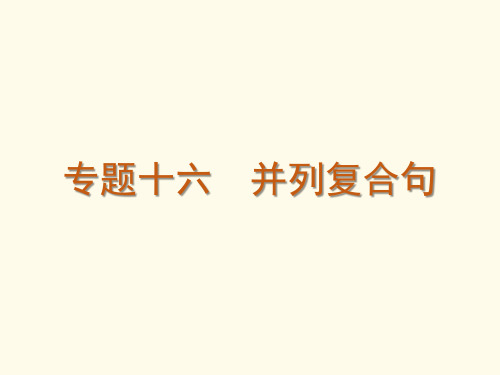
If we stay at home, it is comfortable and there is no need to spend money. 如
果我们待在家里,既舒适又没有必要花钱。
He is not only my teacher but (also) my good friend.
他不仅是我的老师,也是我的好朋友。
逗号)
He is poor, and yet he is happy.(副词表转折, 因为前面有并列连词and)
他虽然穷,但是很幸福。
Though he is poor, yet he is happy.(副词表转折)
他虽然穷,但是很幸福。
课标必备点梳理
选择关系
or,either...or...
We may be leaving today or tomorrow.我们可能今天或是
①sb. was doing sth. when...
②sb. was about to/going to do sth. when...
③sb. was on the point of doing sth. when...
④sb. had just done sth. when...
We were having a meeting when someone broke in.
他母亲不会去那里,但他父亲也许会去。
Some sports are usually done indoors, while others are done outdoors. 有些运
动通常在室内进行,而有些则在室外进行。
2.yet既可以用作并列连词,也可以用作副词。
He is poor, yet he is happy.(连词表转折, 此来自注意 yet的位置且前面必须加
高考英语语法讲解——主从复合句(附练习题及答案)
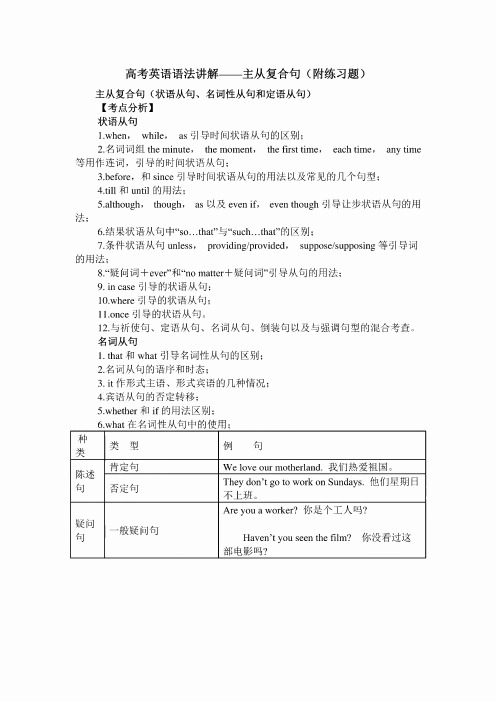
高考英语语法讲解——主从复合句(附练习题)主从复合句(状语从句、名词性从句和定语从句)【考点分析】状语从句1.when,while,as引导时间状语从句的区别;2.名词词组the minute,the moment,the first time,each time,any time 等用作连词,引导的时间状语从句;'3.b efore,和SinCe引导时间状语从句的用法以及常见的几个句型;4.t ill和Until的用法;5.a l t hough,though,as以及even if,even though引导让步状语从句的用法;6.结果状语从句中“so...that"与“such...that”的区别;7.条件状语从句UnIeSS,PrOViding/provided,SUPPOSe/supposing等引导词的用法;、、8.“疑问词+ever"和"no matter+疑问词"引导从句的用法;9.in CaSe引导的状语从句;10.where引导的状语从句;11.once引导的状语从句。
12.与祈使句、定语从句、名词从句、倒装句以及与强调句型的混合考查。
名词从句1.that和What引导名词性从句的区别;2.名词从句的语序和时态;3.it作形式主语、形式宾语的几种情况;4.宾语从句的否定转移;5.whether和if的用法区别;6.what在名词性从句中的使用;种类_类型例句陈述句肯定句We IOVe OUr motherland.我们热爱祖国。
否定句They don,t go to WOrk On Sundays.他们星期日不上班。
____________________________________疑问句一般疑问句Are you a worker?你是个工人吗?HaVen,t you Seen the film?你没看过这部电影吗?__________________________________7. doubt 后的名词性从句的使用;8. W ho / WhOeVer , What / WhateVer 等的用法区别;9. 连接词that 的省略;定语从句!.that 与WhiCh 引导的定语从句的区别;特殊疑问句WhO is the man?这人是谁?When do you WatCh TV?你什么时间看电视?What are they doing now?他们现在正在干什么?____________________________________选择疑问句DO you Want tea Or coffee? Either Will do.你要茶水还是要咖啡?哪种都行。
初中英语复合句中考专项讲解与练习
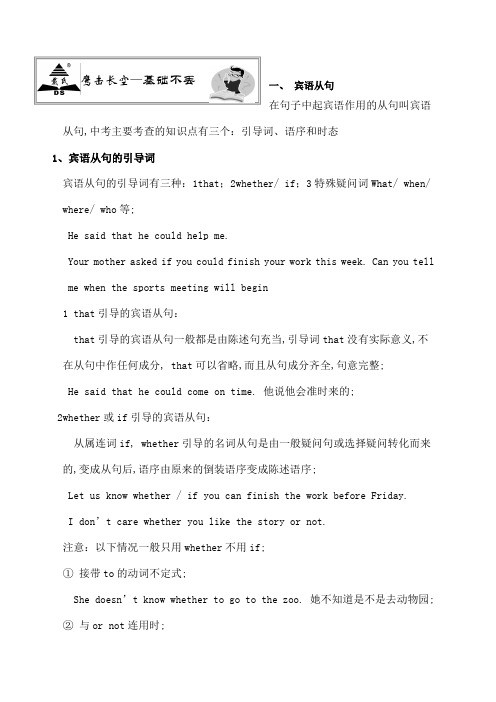
鹰击长空—基础不丢一、宾语从句在句子中起宾语作用的从句叫宾语从句,中考主要考查的知识点有三个:引导词、语序和时态1、宾语从句的引导词宾语从句的引导词有三种:1that;2whether/ if;3特殊疑问词What/ when/ where/ who等;He said that he could help me.Your mother asked if you could finish your work this week. Can you tell me when the sports meeting will begin1 that引导的宾语从句:that引导的宾语从句一般都是由陈述句充当,引导词that没有实际意义,不在从句中作任何成分, that可以省略,而且从句成分齐全,句意完整;He said that he could come on time. 他说他会准时来的;2whether或if引导的宾语从句:从属连词if, whether引导的名词从句是由一般疑问句或选择疑问转化而来的,变成从句后,语序由原来的倒装语序变成陈述语序;Let us know whether / if you can finish the work before Friday.I don’t care whether you like the story or not.注意:以下情况一般只用whether不用if;①接带to的动词不定式;She doesn’t know whether to go to the zoo. 她不知道是不是去动物园;②与or not连用时;I’m not sure whether or not he will come on time. 他能否准时来,我说不准;3疑问词引导的宾语从句:此类宾语从句原来是特殊疑问句,变成宾语从句后要用陈述语序,由wh-开头的疑问词引导;wh-词包括who, whom, whose, what, which等连接代词和where, when, how, why等连接副词,这些引导词有各自的意思,在从句中要作相应的成分,不能省略;例如:Could you tell me which gate we have to go toHe didn’t tell me how long he would stay here.2、宾语从句的三个注意事项1语序:宾语从句要用陈述语序,原来的倒装语序改成陈述语序时注意相应的助动词和动词的变化等;把这两个简单句合成一个复合句:Where does your father work Can you tell us →____________________________________________________Did you get home very late He asked me.→__________________________________________________2时态:如果主句是一般现在时,宾语从句根据实际情况用各种时态;My teacher says he will be back in a week. My teacher says he has seen the movie. 如果主句是一般过去时,宾语从句用相应的过去时态;My father said he was watching TV at that time. My father said the he had already seen the movie.如果宾语从句是表示客观真理和规律的句子时,用一般现在时;Our teacher told us the sun is much bigger than the earth. 我们的老师告诉我们太阳比地球大多了;3 否定转移:主句的主语如果是第一人称,从句的否定要转移到主句中,其反意疑问句与从句一致;例如:I don’t think they’ll wait to the last minute.I don’t believe he did this, did he二、定语从句用作定语的从句叫定语从句;定语从句一般放在它所修饰名词或代词的后面,这个名词或代词叫先行词,引导定语从句的连接词称为关系代词或者关系副词;关系代词在从句中代表先行词可以作主语、宾语、定语等;关系副词代表先行词在从句中可以作状语;1. 选出正确的关系代词或关系副词的关键:①看所修饰的是人还是物;②看它所代表的先行词在定语从句中做什么成分;例如:Do you know the man who/that sells eggs to me先行词是“the man”,在从句中作主语,用who/ thatYour father was not on the train that/ which arrived just now.先行词是物,用which/that,在从句中作主语This is the book which / that you wanted.先行词是物,用which/that,在从句中作宾语,可省Do you know the boy whose father is a doctor先行词是人,whose代表“男孩的”,在从句中作定语You can go home where you can have a rest.先行词是地点,where相当于at home,在从句中作地点状语Do you remember the year when we were hungry every day先行词是时间,when相当于in the year,在从句中作时间状语Do you know the reason why she didn’t come to our party 先行词是原因,why相当于for the reason,在从句中作原因状语2. 引导词作宾语时可以省略;例如:Have you seen the book that I gave you yesterday3. 引导词在定语从句中作主语,不能省略;例如:Do you know the man who is speaking to your father三、状语从句用作状语的句子叫状语从句;引导状语从句的连接词是从属连词;状语从句可以在句首,也可以在句尾,根据其用途可分为:时间状语从句、地点状语从句、原因状语从句、结果状语从句、目的状语从句、条件状语从句,比较状语从句等; 1. 时间状语从句:时间状语从句表示时间,常用连接词有:when当……时,while 当……时,as当……时,before在……之前,after在……之后,since自从,until 直到, as soon as一……就,once一旦……就等;例如:I didn’t go to bed until I finished my homework.I can listen to the radio while I work.注意:①时间状语从句中,要用一般现在时代替一般将来时;I will telephone you when he comes.I’ll stay here until you come back.② when引导时间状语从句,表示主句的动作和从句的动作同时或先后发生,从句的谓语可以是延续性动词,也可以是瞬间动词;例如:He was working when I went in.When she heard the news, she began to cry. while引导的状语从句中常用延续性动词或表示状态的动词,意思是“在……期间”;They rushed in while we were singing. 我们唱歌时,他们冲进来;as引导状语从句,强调同时发生,不分先后;可以译成“随着”或“一边……一边”;John sings as he walks home.③ while还可以表示两者之间的对比关系;I like playing football, while Tom likes listening to music.④ since引导状语从句,主句常用现在完成时,从句常用一般过去时;We have been friends since we met in Beijing. It has been six years since she left school.2. 地点状语从句:地点状语从句表示地点;其连接词有where哪里,wherever无论哪里等;Put it where you find it. You can sit wherever you like.3. 原因状语从句:原因状语从句表示原因或者理由;其连接词有:because因为,as 因为,since既然等;I often eat carrots because they are good for my health.As I don’t know the way, I had to ask the policeman.注意:① because表示因果关系语气最强,常用来回答why提出的问题;I didn’t tell them because they were too young.② because和so不能同在一个句子里;Because the book was expensive, Idi dn’t buy it. I 前不用so4. 结果状语从句:表示结果;其连接词有:so…that…如此……以致……,so that 结果,such… that…如此……以致……等;It’s such a good chance that you can’t miss it.注意:so…that 和such …that 都可以引导结果状语从句,注意so和such后面所接的词不同;① such... thatHe was such an honest man that he was praised by the teacher.They are such interesting novels that I want to read them once again.②但是如果名词前由many、much、few、little少等词修饰,则用so;例如:He had so many falls that he was black and blue all over.③ so ... thatHe runs so fast that nobody can catch up with him.Dr. Wang is so good that everybody loves and respects him.=He is so good a doctor that everybody loves and respects him.=He is such a good doctor that everybody loves and respects him.5. 目的状语从句:表示目的;其连接词有:so以便,so that为了,in order that 为了等,从句中多用情态动词can, will, may, should 等;He got up very early so that he could catch the first train.6. 条件状语从句:条件状语从句表示条件;其连接词有:if如果,unless 如果不,除非,as long as只要等;If it is fine tomorrow, we will go swimming. 如果明天天气好的话我们去游泳;注意:①条件状语从句中,要用一般现在时代替一般将来时;Unless it rains, the game will be played. 如果不下雨,比赛就将进行;② unless意思相当于if…not…;7. 让步状语从句:常由though/although 虽然,even if/ though 即使等引导; Though it’s hard work, I enjoy it.1. I don’t know if you come tomy party tomorrow. 〔解析〕本题是考查宾语从句的时态用法,从句子的意思理解是if 引导的宾语从句,要用一般将来时,此题误用作状语从句了;所以应把come 改为will/ can come;2. Can you tell me where does he study English〔解析〕本题是考查宾语从句的语序的用法,特殊疑问词引导的宾语从句用陈述语序,所以把助动词does 去掉,而且因为从句主语是he,还要把study 变成studies;3. My teacher told me that light traveled faster than the sound.〔解析〕本题是考查宾语从句的时态用法;宾语从句是表示客观真理即光速比声速快,所以宾语从句用一般现在时,而不受主句时态的影响;所以要把traveled 改为travels;4. They are the people and books who you want to learn.〔解析〕本题是考查定语从句的引导词用法,定语从句的先行词既有人和也有物,所以引导词要用人和物共用的that,不能用who 或者which;所以要把who 改为that;5. He got to school early if he could clean the classroom.〔解析〕本题是考查表示目的的状语从句的连接词的用法;if 引导条件状语从句,而此句应该用连接词so that 引导目的状语从句;所以把if 改为so that;T-shirt is so cool. Could you 突飞猛进—过手训练 突飞猛进—过手训练tell me________A. where you buy itB. where do you buy itC. where you bought itD. where did you buy it2. I can't forget the time ________ the earthquake happened in Yushu.A. whenB. whichC. thatD. where3. If the child _______, please telephone the police.A. foundB. is foundC. was foundD. has found4. I hurried _______I wouldn't be late for class.A. soB. so thatC. ifD. un less5. This is my beautiful school ________ is near the famous library.A. whereB. whichC. whoD. when6. Friends are those ________ make you smile,always open their hearts to you and encourage you to succeed.A. whichB. whatC. whomD. who7. —Does anyone know ________—I hear that he was born in Sweden.A. what he isB. when he was bornC. where he comes fromD. which country is he from8. I don't know if Jack ________. If he ________, call me, please.A. will come; will comesB. comes; comeC. comes; will comeD. will come; comes9. The TV play is about a true story ________ happened in Mianyang in 1998.A. itB. whatC. thatD. whensaid that she ___ to Guangzhou.A. has never goneB. had never goneC. has never beenD. had never been11. We ______ TV when the telephone ________.A. watched, was ringingB. were watching, rangC. were watching, ringsD. are watching, rang12. Do you like music ______ makes you relaxedA. itB. whatC. whoD. that13. —Do you know ________ the MP4 yesterday—Sorry. I've no idea about it.A. how much did he pay forB. how much he paid forC. he paid for how muchD. he paid how much for14. Is that the man ________ helped us a lot after the earthquakeA. whereB. whichC. whenD. who15. He met many problems ________ he was going over his lessons.A. beforeB. as soon asC. since D .while16. I don't know _________ the day after tomorrow.A. when does he comeB. how will he comeC. if he comesD. whether he'll come17. ________ well you drive, you must drive carefully.A. No matter whereB. In order thatC. No matter howD.As soon as18. We have to get up at 7:15 tomorrow morning, ________ we will be late for the 7:40 train.A. beforeB. orC. ifD. so19. Do you know what time _________A. the train leaveB. does the train leaveC. will the train leaveD. the train leaves20. I don't know _________. Can you tell me, pleaseA. how the two players are oldB. how old are the two playersC. the two players are how oldD. how old the two players are 21.Sorry, we don't have the coat ________ you need.A. whatB. whoC. whomD. which22. It's a serious problem. We can't decide ________ comes back.A. whileB. since C .until D. so23. It's snowing outside Put on more clothes, ________ you may catch a cold.A. andB. butC. orD. though24. The policeman asked me ________ at this time yesterday.A. what was I doingB. what did I doC. what I was doingD. what I do25. ______China is growing stronger and stronger, Chinese is taught in more and more countries.A. IfB. UnlessC. AsD. Although26.—Tommy, do you know if Frank _______ to the theatre with us this Sunday if it ________—Sorry, I have no idea.A. will go; is fineB. goes; is fineC. will go; is going to be fineD. goes; will be fine27. Could you ring me up as soon as he ______A. arrivedB. would arriveC. arrivesD. will arrive28. She asked Linda if___ go and get some.A. could sheB. she couldC. she canD. she may29. Linda said the moon___ round the earth.A. travelledB. has travelledC. travelsD. had travelled30. ---Who is the man _______ was talking to our English teacher---Oh It’s Mr Baker, our maths teacher.A. heB. thatC. whomD. which31. I hate the people ________ don’t help others when they are in trouble.A. whoB. whichC. theyD. where32. The foreigner _________ visited our school is from Canada.A. whichB. whenC. whoD. whom33. George Mallory was an English school teacher _______ loved climbing.A. whoB. whomC. heD. which34. This is the place ____I have ever visited.A. thereB. whenC. whereD. which35. Nobody knows the reason ______ she didn’t come to the meeting.A. thatB. whichC. whyD. when36. The moon is a world ______ there is no life.A. thatB. whichC. whereD. why37. He has forgotten the day _______ he arrived.A. whenB. whereC. thatD. which38. He still remembers the days ______ he spent with your family.A. whenB. whereC. thatD. on which39. Mr. White, ______ car had been stolen, came to the policeman.A. whoB. thatC. whoseD. which40. He got to the village _______ his family once lived before liberation.A. thatB. whichC. whenD. where。
句子成分、简单句并列句复合句及练习(高考复习完整版)
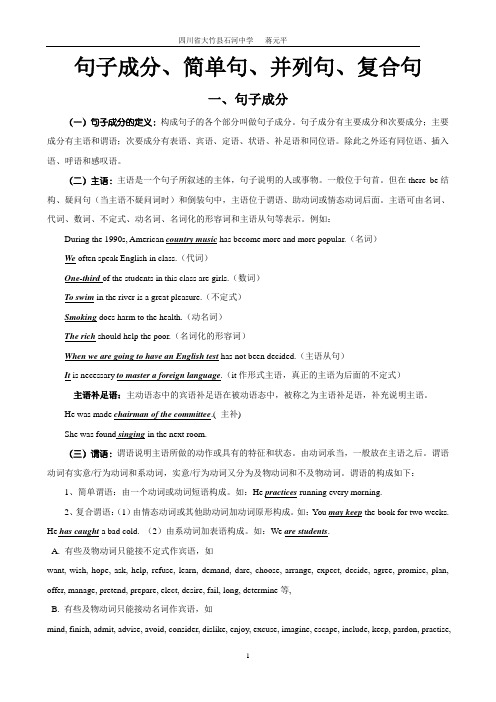
句子成分、简单句、并列句、复合句一、句子成分(一)句子成分的定义:构成句子的各个部分叫做句子成分。
句子成分有主要成分和次要成分;主要成分有主语和谓语;次要成分有表语、宾语、定语、状语、补足语和同位语。
除此之外还有同位语、插入语、呼语和感叹语。
(二)主语:主语是一个句子所叙述的主体,句子说明的人或事物。
一般位于句首。
但在there be结构、疑问句(当主语不疑问词时)和倒装句中,主语位于谓语、助动词或情态动词后面。
主语可由名词、代词、数词、不定式、动名词、名词化的形容词和主语从句等表示。
例如:During the 1990s, American country music has become more and more popular.(名词)We often speak English in class.(代词)One-third of the students in this class are girls.(数词)To swim in the river is a great pleasure.(不定式)Smoking does harm to the health.(动名词)The rich should help the poor.(名词化的形容词)When we are going to have an English test has not been decided.(主语从句)It is necessary to master a foreign language.(it作形式主语,真正的主语为后面的不定式)主语补足语:主动语态中的宾语补足语在被动语态中,被称之为主语补足语,补充说明主语。
He was made chairman of the committee.( 主补)She was found singing in the next room.(三)谓语:谓语说明主语所做的动作或具有的特征和状态。
复合句专项练习

复合句专项练习
本文档旨在提供一个复合句的专项练,以帮助读者提高复合句的运用能力。
以下是一些练题,读者可以尝试完成,并在完成后对照答案进行自我评估。
练题
1. 将下面的两个简单句合并为一个复合句:
- 他经常锻炼身体。
- 他很健康。
2. 将下面的两个简单句合并为一个复合句:
- 他很勇敢。
- 他总是保持冷静。
3. 将下面的两个简单句合并为一个复合句:
- 她努力研究。
- 她加快进度。
4. 将下面的两个简单句合并为一个复合句:
- 他跑得很快。
- 他很快就追上了。
5. 将下面的两个简单句合并为一个复合句:
- 她把书放在桌子上。
- 她走了出去。
参考答案
1. 他经常锻炼身体,所以他很健康。
2. 他很勇敢,而且他总是保持冷静。
3. 她努力研究,以加快进度。
4. 他跑得很快,结果很快就追上了。
5. 她把书放在桌子上,然后走了出去。
请读者完成以上练,并对比答案进行自我评估。
通过不断练,读者将逐渐提高复合句的应用能力。
祝练习顺利!。
语法知识—并列复合句的技巧及练习题附答案
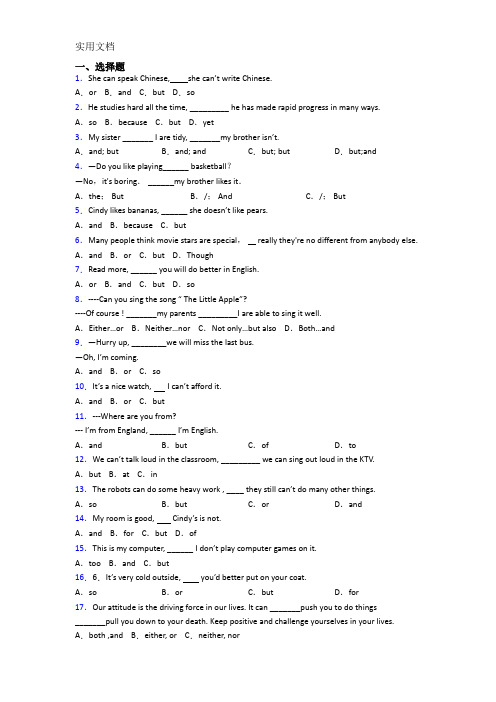
一、选择题1.She can speak Chinese, she can’t write Chinese.A.or B.and C.but D.so2.He studies hard all the time, _________ he has made rapid progress in many ways.A.so B.because C.but D.yet3.My sister _______ I are tidy, _______my brother isn’t.A.and; but B.and; and C.but; but D.but;and4.—Do you like playing______ basketball?—No,it's boring. ______my brother likes it.A.the; But B./; And C./; But5.Cindy likes bananas, ______ she doesn’t like pears.A.and B.because C.but6.Many people think movie stars are special, really they're no different from anybody else. A.and B.or C.but D.Though7.Read more, ______ you will do better in English.A.or B.and C.but D.so8.----Can you sing the song “ The Little Apple”?----Of course ! _______my parents _________I are able to sing it well.A.Either…or B.Neither…nor C.Not only…but also D.Both…and9.—Hurry up, ________we will miss the last bus.—Oh, I’m coming.A.and B.or C.so10.It’s a nice watch, I can’t afford it.A.and B.or C.but11.---Where are you from?--- I’m from England, ______ I’m English.A.and B.but C.of D.to12.We can’t talk loud in the classroom, _________ we can sing out loud in the KTV.A.but B.at C.in13.The robots can do some heavy work , ____ they still can’t do many other things.A.so B.but C.or D.and14.My room is good, Cindy’s is not.A.and B.for C.but D.of15.This is my computer, ______ I don’t play computer games on it.A.too B.and C.but16.6.It’s very cold outside, you’d better put on your coat.A.so B.or C.but D.for17.Our attitude is the driving force in our lives. It can _______push you to do things_______pull you down to your death. Keep positive and challenge yourselves in your lives. A.both ,and B.either, or C.neither, nor18.Would you like some drink ________ shall we set down to business right away?A.and B.then C.or D.so19.Jane is polite helpful but he has no brothers sisters.A.and; or B.but; and C.and; and D.or; and20.Don't give up, ___ you will never succeed.A.and B.but C.or D.though21.Hurry up, we’ll be late for the concert. There are only 10 min utes left.A.and B.or C.so D.but22.Take exercise every day, ______ you’ll become stronger and healthier.A.or B.and C.but D.while23.— Jim is a helpful student.—I think so. Thanks to him, ________ we can’t do it successfully.A.or B.so C.but D.because24.— Be careful, _ you will make fewer mistakes.—Thanks for encouraging me.A.but B.or C.and D.so25.Mao Dun is Cindy’s favourite writer. He died in 1981, _____ his works are still popular today. A.or B.but C.however D.and【参考答案】***试卷处理标记,请不要删除一、选择题1.C解析:C【解析】句意:她会说中文,但不会写中文。
(完整版)中考英语复合句练习题及答案详解

中考复习复合句(C )1.Tom will call me as soon as he ___A___ home. (2010北京) A.gets B.has got C.got D.will get( D )2.—I’m leaving now. —___B___ you turn off the lights. (2010浙江杭州)A. To make sureB. Make sureC. Made sureD. Making sure( B )3. ---Shall I tell Bob the news?---No, you __D___. I’ve told him already.A. shouldn’tB. wouldn’tC. mustn’tD. needn’t( B )4.We won’t start the meeting ___ our teacher arrives. (2010天津) A.though B.until C.while D.or( B )5.He wanted to know ____D___ the English party. (2010天津) A.when will we have B.when we willhave C.when would we have D.when we should have( A )6.Jamie is a young cook ____ wants to improve school dinners. A.who B.whose C.whom D.which( D )7.We will have no water to drink ____ we don’t protect the earth. A.until B.before C though D.if( A )8.I want to know ________.(2010上海) A.when we should arrive at the airport B.when should we arrive at the airport C.when the airport we should arrive at D.when the airport should we arrive at( B )9. ---Another cup of coffee?---No, thanks. I __C__ be off. Mary is waitingfor me.A. canB. mayC. must D, might( D )10.--David, look at the man in white over there.Can you tell me ____?—He is a doctor. (2010重庆)A.Who is he B.who he is C.what is he D.what he is( A )11. ---What would you send to your sister asthe Christmas gift?---I haven’t decided yet. I _____ send her ahandbag.A. shallB. mayC. mustD. should( B )12.— ______ is her daughter? —The girl on the right wearing blue jeans.(2010浙江杭州)A. WhoB. WhatC. WhichD. Where( C )13.—________? —He’s very well.(2010云南昆明) A.Who’s your father B.How’s your father C.What’s your father D.Where’s your father( )14.—Did you hear about the recent air crash? —Yeah,_____ a few this year,weren’t there? (2010云南昆明) A.there are B there aren’t C.there were D.there weren’t( )15.—Look! It’s raining heavily.______ take a raincoat with you? —Well, I’ll take one right now. (2010重庆)A.Why not B.Why don’tC.Would you mind D.Would you like自我检测一、单项选择( )1. I don’t know when _____.A. will the train leaveB. the trainwill leave C. would the train leaveD. the train leave( )2. Do you know what _____ with Jim?A. is wrongB. wrong isC. wrong wasD. the matter is( )3. -I want to know _____. -Why not goto the park?A. where I can go for a picnicB. where can I go for a picnicC. what I can go for a picnicD. what canI go for a picnic( )4. I don ’t think he is right, ______?A. do IB. isn ’t heC. is heD. don ’t I( )5. The teacher didn’t say you would come, _____? A. would you B. wouldn ’t you C. did she D. didn ’t you( )6. While she _______TV in the sitting room, the bell ____ . A. watches, rings B. is watching, rang C. was watching, rang D. watched,was ringing( )7. ---Mr Wang, must I come again on Sundaymorning to clean thewindows?---No, you _____. I have asked others to do it.A. don’t have toB. mustn’tC. can’tD. shouldn’t ( )8. Don't cross the road _______the light turns green. A. when B. while C. until D. as ( )9. She will find him a kind man when she________ more about him.A. knowsB. knowC. will knowD. is going to know ( )10. It is ten years _______I left my hometown. A. since B. if C. whether D. until ( )11. I was cooking ________he was reading a book.A. afterB. whileC. becauseD. but( )12. She worked _____quietly that ______no one knew she was there. A. so, as B. so, that C. too, to D. very, that ( )13.---Who is the girl standing over there? ---Well, if you _____ knew, her name is Joe. A. must B. may C. can D. shall( )14.It’s a secret between you and me, you ____ tell anyone about this. A. must B. can C. mustn’t D.needn’t( )15. I _______him since we met last in 1981. A. don't see B. didn't see C. won't see D. haven't seen( )16. ---Shall I tell John about it?---No, you ______. I told him just now.A. needn’tB. can’tC. mustn’tD.shouldn’t( )17. They wondered if the teacher___ them some English songs thenext week.A. would teachB. had taughtC. will teachD. taught( )18. ---Do I have to come back tomorrow? ---Yes, you____.A. can B. may C. must D. should ( )19. He told me ____ Paris is the capital of France.A. whichB. theC. thatD. what ( )20. He asked me____ during the summer holiday. A. where I had gone B. where I had been C. where had I gone D. where had I been ( )21. Can you tell us ____ ? A. if your father does B. what does your father doC. your father does whatD. what your father does ( )22. He asked me if I knew____ . A. whose pen was it B. whose pen it was C. whose pen it is D. whose pen is it ( )23.---How is your friend coming?---I’m not sure. He ______ drive here. A. may B. can C. must D. will ( )24. —Do you know ____ ? —Yes. He is ateacher. A .whom he is B. whom is he C. what is he D. what he is( )25. I'm not sure whether ______ tomorrow. A. they will arrive B. will they arrive C. they arrive D. they have arrived 二、用适当的关系代词或关系副词填空。
- 1、下载文档前请自行甄别文档内容的完整性,平台不提供额外的编辑、内容补充、找答案等附加服务。
- 2、"仅部分预览"的文档,不可在线预览部分如存在完整性等问题,可反馈申请退款(可完整预览的文档不适用该条件!)。
- 3、如文档侵犯您的权益,请联系客服反馈,我们会尽快为您处理(人工客服工作时间:9:00-18:30)。
复合句(complex sentence)
定义:
用一个句子来充当某个句子成分(主、宾、表、定、状、同位),从而构成一个从句,该从句(subordinate clause)前需要使用“关系词(relative words)”来与主句(main clause)连接在一起,形成一个完整的句子。
从句类型:
1)从句在主句的主语位置,称之为主语从句(subject clause),由于主语在句首,所以主语从句的位置通常为句首。
2)从句在主句的宾语位置,称之为宾语从句(object clause),由于宾语在谓语后面,所以谓语动词后面的句子通常是宾语从句。
3)从句在主句的表语位置,称之为表语从句(predicative clause),如果一个句子出现在系动词后面,通常是表语从句。
4)从句在主句的定语位置,称之为定语从句(attributive clause),由于超过一个单词的定语通常放在名词后面,修饰限定前面的面请,所以名词后面出现句子,通常是定语从句(当然同位语从句除外)。
5)从句在主句的状语位置,称之为状语从句(adverbial clause),由于状语通常出现在一个句子的句首或者句末,而且常有逗号隔开,所以如果一个带有关系词的句子出现在另一个句子的句首或者句末并用逗号隔开了,通常就是状语从句。
6)句子本身已有主语,如果主语后面再增加一个句子来对主语的性质和身份做具体的说明,则称之为主语同位语(appositive clause)。
而句子本身已有宾语,如果宾语后面再增加一个句子来对宾语的性质和身份做具体的说明,则称之为宾语同位语。
判断主从句:
1)复合句中,句首不带关系词的句子为主句,带关系词的句子为从句(但是要注意关系词省略的情况:宾语从句的关系词通常可省略,定语从句所修饰的名词在定语从句充当宾语的话关系词可以省略),判断出主从句以后,就可以根据从句的位置判断属于哪类从句。
练习
判断一下哪些句子是复合句,并标出从句部分,说明属于哪类从句。
1. They did not make me happy, however, as this was the day I was to be thrown into school for the first time.
2. My mother stood at the window watching our progress, and I turned towards her form time to time, hoping she would help.
3. We walked along a street lined with gardens and fields planted with crops, pears and date palms.
4. It’s a place that makes useful men out of boys.
5. I didn’t believe there was really any good to be had in tearing me away from my home and throw me into huge, high-walled building.
6. When we arrived at the gate we could see the courtyard, vast and full of boys and girls.
7. I hesitated and clung to his hand, but he gently pushed me from him.
8. You’ll find me waiting for you when it’s time to leave.
9. I didn’t know a single one of them, and none of them knew me.
10. I felt I was a stranger who had lost his way.
11. But then some boys began to glance at me in curiosity, and one of them came over and ask “who brought you?.
12. We were formed into an intricate pattern in the great courtyard surrounded by high buildings; from each floor we were overlooked by a long balcony roofed in wood.
13. Everything that is enjoyable and beneficial is here.
14. It seemed that my misgivings had had no basis.
15. I had never imagined school would have this rich variety of experiences.
16. We saw a globe of the Earth, which revolved and showed the various continents and countries.
17. We started learning numbers, and we were told the story of the Creator of the universe.
18. And while the lady would sometimes smile, she would often yell and scold.
19. In addition, the time for changing one’s mind was over and gone and there was no question of ever returning to the paradise of home.
20. Those who were able took advantage of the opportunities for success and happiness that presented themselves.
21. The children rushed towards the gate, which was opened again.
22. When I waited for a long time in vain, I decided to return home on my own.
23. High buildings had taken over, the street was full of children, and disturbing noises shook the air.
24. I hurried towards the crossroads because I remembered that I had to cross the street to reach house, but the stream of cars would not let up.
25. I stood there a long time, until the young boy employed at the ironing shop on the corner came up to me.。
